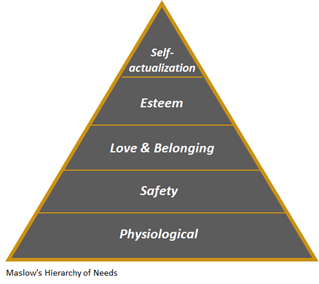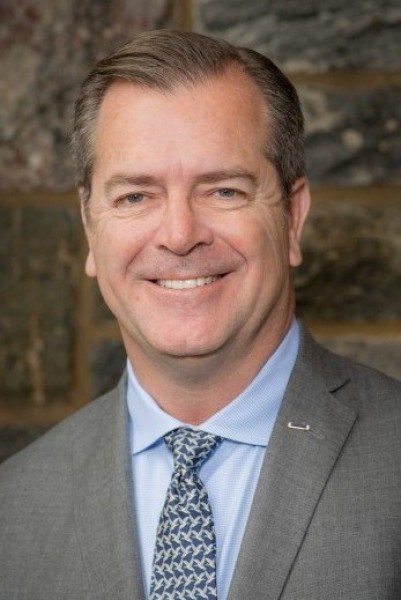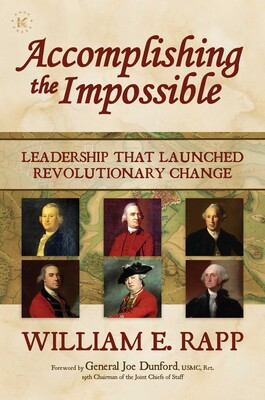Avoiding the Great Resignation: Seeking Love, Belonging and Self-Actualization
By Thayer President, Dan Rice, MS.Ed., Friday, February 25, 2022
Amidst ever-changing uncertainty and insurmountable priorities, companies around the globe during the onset of the COVID-19 pandemic were finding ways to support their employees while working from home, gathering personal protective equipment, and keeping their businesses running. Dynamic in-person meetings were replaced by never-ending Zoom fatigue and social distancing. Company culture and work relationships were strained as employees and leaders alike tried to make sense of the “new normal” – balancing work and home life that bled together 24 hours a day.
At the start of COVID, corporate leaders acted in accordance with Maslow’s Hierarchy of Needs – prioritizing the physiological and safety needs of their individual employees and customers by closing corporate offices and implementing work-from-home, flex time, and expanded sick-leave policies. Abraham Maslow, an American psychologist, created the theory in his 1943 article, "A Theory of Human Motivation.” In this article, he outlines the five categories of innate human needs in priority order, starting with physiological as the foundation, followed by safety, love/belonging, esteem, and peaking in self-actualization. The fulfillment (or lack thereof) of each of these needs dictates an individual’s behavior and motivations. Simply, humans must have each of their physiological needs met at the bottom of the pyramid, and then intrinsically work their way up to meet the next need until they reach self-actualization, otherwise known as full potential or purpose.

The $166 billion US leader development business (source: Forbes) largely shut down in March 2020 with the start of the COVID crisis. Few companies had the bandwidth or fortitude at the start of COVID to think of taking the time during crisis to continue developing their leaders, to help each employee reach self-actualization, when their very existence as a company, and as individuals, was threatened. We, at Thayer Leadership, had 150 in-person corporate programs cancelled within just a 2-week period in March 2020. Leadership development investment prior to COVID was being put to the test as leaders found themselves now on the front lines in the most volatile, uncertain, complex, and uncertain (VUCA) environment of their lives. Basic security and safety were the only priorities for surviving the crisis.
Throughout 2020, few employees were leaving companies voluntarily. According to The Work Institute’s 2020 Retention Report, a resource for employee retention programs, employee engagement strategies, and workplace solutions, attrition rates reached their lowest level in decades during this time. Employees kept whatever job they entered the crisis with – if they could – even if compensation was cut or hours were extended, since it was better than no income at all during a period of high uncertainty. Power was with the employer. In one of the greatest crises of the century, employees focused on the bottom two levels of Maslow’s Hierarchy of Needs – physiological and safety.
Oh, how times have changed! 24 months later, and companies are now in the midst of the “Great Resignation.” Power has shifted in a blink, from the employer to the employee. Unemployment is at a record low. Wage inflation has begun. Economists estimate that companies will experience 20-30% turnover in 2022. Many companies can’t hire enough employees to meet demand. Airlines are cancelling flights because they don’t have enough qualified pilots or employees. Voluntary turnover is reaching all-time highs, threatening many companies’ ability to execute on their mission. Again, an existential threat to the survival of most businesses, but this time, paradoxically, from within, by the collapse of the employee base.
After being isolated and locked down, many Americans want more meaning in their life and are realizing the most important criteria to them, as an individual, is not at the bottom of Maslow’s pyramid, but at the top. With the ability to work from anywhere and confidence they can find a better job, often without leaving the couch, employees are now seeking love, belonging, and self-actualization. They want to feel part of something greater than themselves. They need to know employers are investing in their personal development, otherwise they will vote with their virtual feet and get a job elsewhere. Maslow’s Hierarchy of Needs has been flipped on its head in the shortest time in generations.
Just as the power has dramatically shifted from the employer to the employee, so has the need, or more importantly, requirement, for leader development.
Great companies recognize this and are heavily investing in their people, helping to improve the lives of their employees by making them better leaders and better people. Lord Abbett, for example, under the CEO leadership of Doug Sieg, who took the helm in 2018 after 20 years with the firm, had begun to transition, prior to COVID, from a rules-based organization to a values-based organization. Seeking to be the most respected asset manager in the world, Lord Abbett transitioned its culture over the past three-and-a-half years. While the 93-year-old investment management firm was already highly regarded in the industry, they recognized the vital importance of investing in leadership to the long-term success of the organization. Thayer Leadership has partnered with Lord Abbett over the past seven years on a journey of transformation, during which the firm has evolved its culture, united around a bold vision, and created its first-ever five-year strategic plan to advance the organization. From the campus of the United States Military Academy at West Point to the beaches of Normandy, France, Thayer has inspired the 45 partners and high potential leaders at Lord Abbett with a ranged of leader development and strategic planning training. Additional training has been cascaded down to people leaders at every level of the organization to drive the firm forward for the next 93-years. These transformative efforts enabled Lord Abbett to enter the COVID-19 pandemic in a position of tremendous strength, thrive in a remote work environment, and position itself for strategic growth opportunities in the post-COVID world.
As employees at all companies re-evaluate their lives now after 24 months of lock-down in many cases, they are looking for employers that will invest in their personal growth. Just as Lord Abbett believes that leadership is the lifeblood at every level of its organization – from entry-level employees to experienced leaders – employees at firms of all kinds now believe that job fulfillment doesn’t just come from increasing salaries, incentives, and benefits. Instead, it comes from their employer’s investment in their development as people and leaders. The success or failure of an organization always comes back to the people within it. Investment in leader development better positions your organization to retain and grow your top talent into powerful leaders who will drive innovation and growth for years to come.
Daniel Rice, MBA, MSed, MS
 ExperienceDan is the Co-President of Thayer Leadership and a 1988 graduate of the U.S. Military Academy at West Point. He is also President of the American University Kyiv, powered by Arizona State University, the first American accredited University in Ukraine. Dan is the Special Advisor to the Commander in Chief... Read More +
ExperienceDan is the Co-President of Thayer Leadership and a 1988 graduate of the U.S. Military Academy at West Point. He is also President of the American University Kyiv, powered by Arizona State University, the first American accredited University in Ukraine. Dan is the Special Advisor to the Commander in Chief... Read More +

Accomplishing the Impossible: Leadership that Launched Revolutionary Change
Major General (Retired) William Rapp
Major General (Retired) William Rapp





